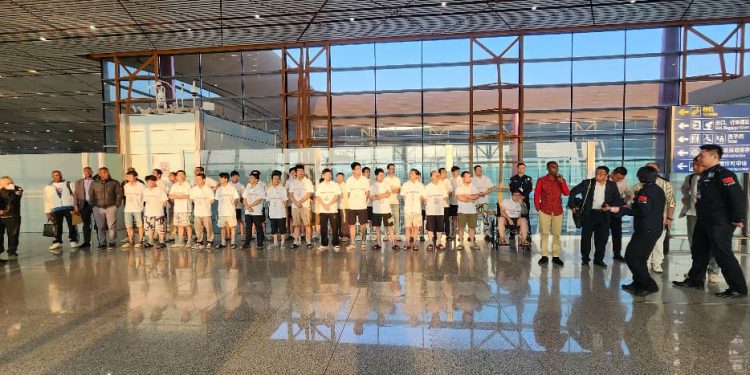The Government’s decision to deport foreign nationals involved in illegal mining and other crimes, rather than prosecute them locally, is drawing mixed reactions from sections of the public. Some Ghanaians have questioned why citizens involved in similar offenses are prosecuted in Ghana, while foreign offenders are repatriated.
Citi News checks have confirmed that foreign nationals, once deported, are handed over to law enforcement authorities in their home countries for prosecution. Sources at the Ministry of the Interior revealed that Ghana’s foreign missions, including the Embassy in China, monitor the legal proceedings closely and provide regular updates to the Ministry.
In a recent operation, 30 Chinese nationals arrested for engaging in illegal mining—popularly known as galamsey—were repatriated and handed over to Chinese immigration officials at the Kotoka International Airport. The handover, led by Superintendent Li Ran, Head of Airport Operations, was conducted in what sources described as a “polite and professional manner.”

According to the source, the Chinese government has expressed support for Ghana’s actions, describing the involvement of its nationals in illegal mining as “disgraceful” and damaging to the strong diplomatic relationship between the two countries.
“Foreigners arrested for illegal mining often exploit loopholes in the judicial process,” the source explained. “They establish connections within security agencies and deliberately choose courts that offer favorable bail terms. Once granted bail, they relocate to different districts and resume their illegal activities, while court cases drag on for years without resolution.”
Since Muntaka Mohammed Mubarak assumed office as Minister for the Interior, more than 100 foreign nationals—including Chinese citizens—have been deported for offenses related to illegal mining and other crimes.
Officials from the Interior Ministry stressed that the deportation strategy is not designed to favor foreigners, but rather to prevent abuse of Ghana’s legal system and safeguard national interests. “The aim is to ensure swift justice and reduce the risk of recidivism among offenders who manipulate court delays and lax bail conditions,” one official noted.

Ghanaian nationals found to have colluded with foreign illegal miners are being prosecuted locally, with the Ministry insisting that there are no exceptions.
Speaking during a meeting with police officers in the Ashanti Region, the Interior Minister issued a stern warning to law enforcement personnel and prosecutors. He cautioned against the practice of altering the identities of foreign suspects in order to shield them from deportation, stressing that those found culpable would face disciplinary action.
The Ministry is also working closely with the embassies of the deportees to streamline repatriation processes. While the embassies cover the cost of flights for their nationals, the Government of Ghana covers travel expenses for Immigration Service officers who accompany them.
According to the Ministry, this approach not only strengthens international cooperation in the fight against transnational crime but also enhances national security and the efficiency of justice delivery. Photographs provided by immigration authorities show Chinese nationals being escorted and received by Chinese officials upon their return for prosecution on charges related to illegal mining and fraud.


